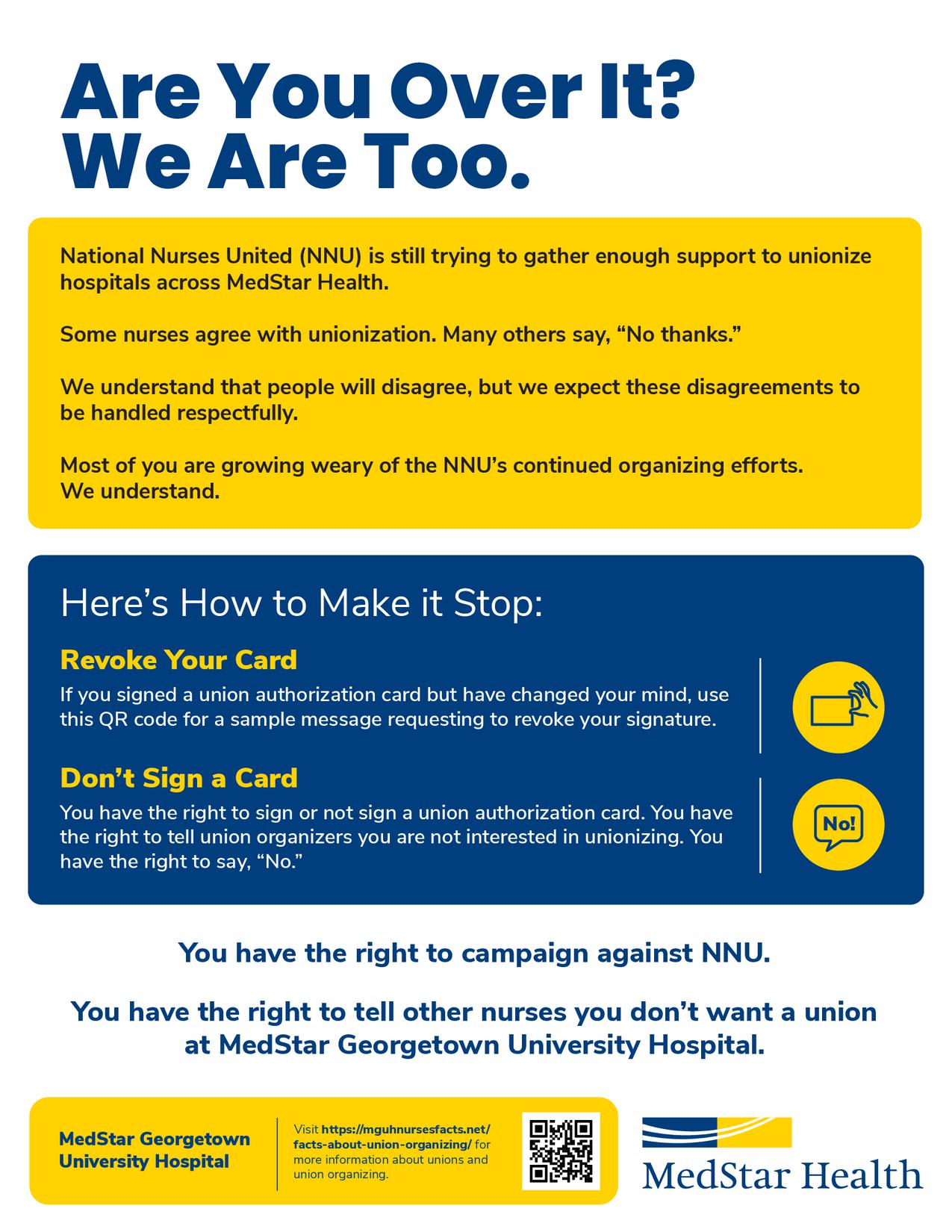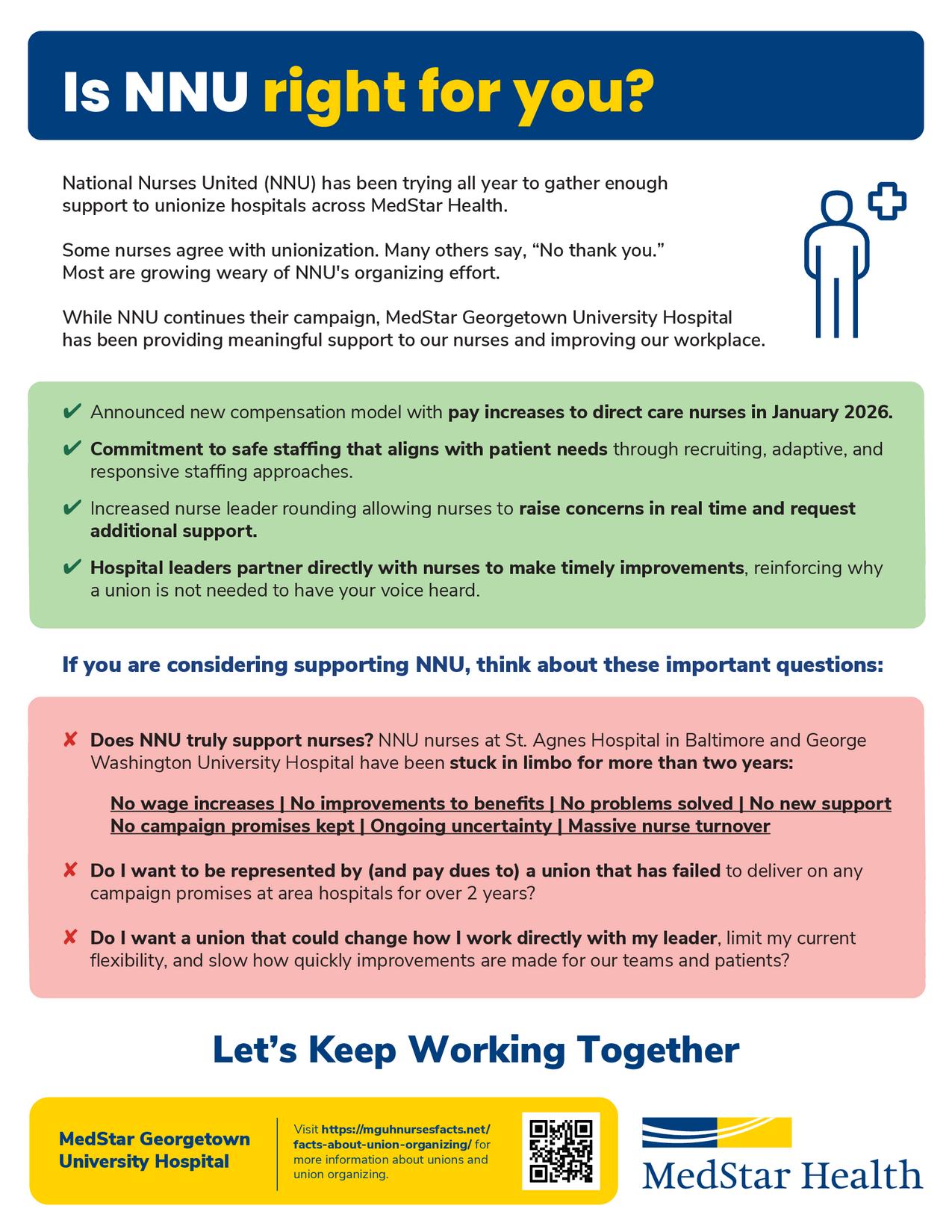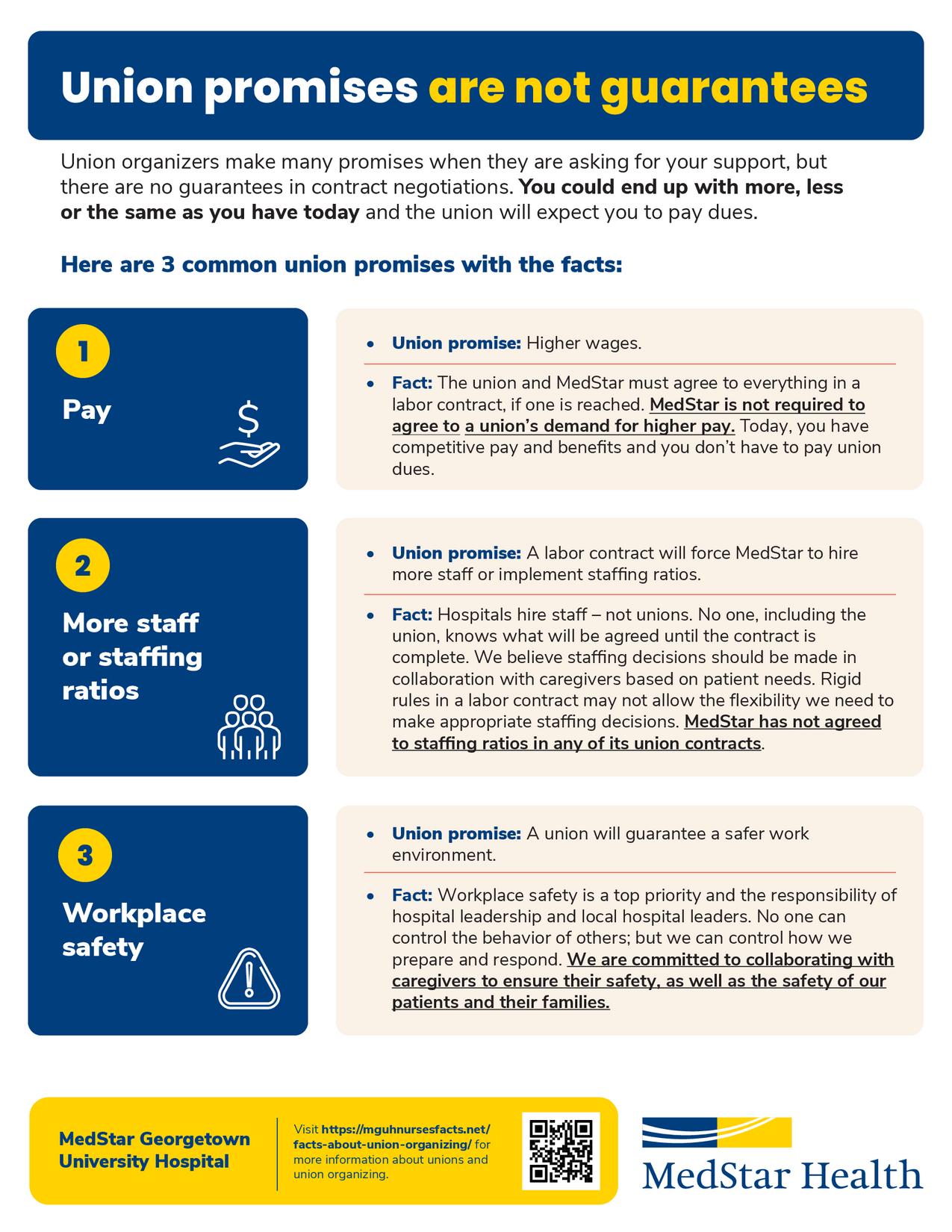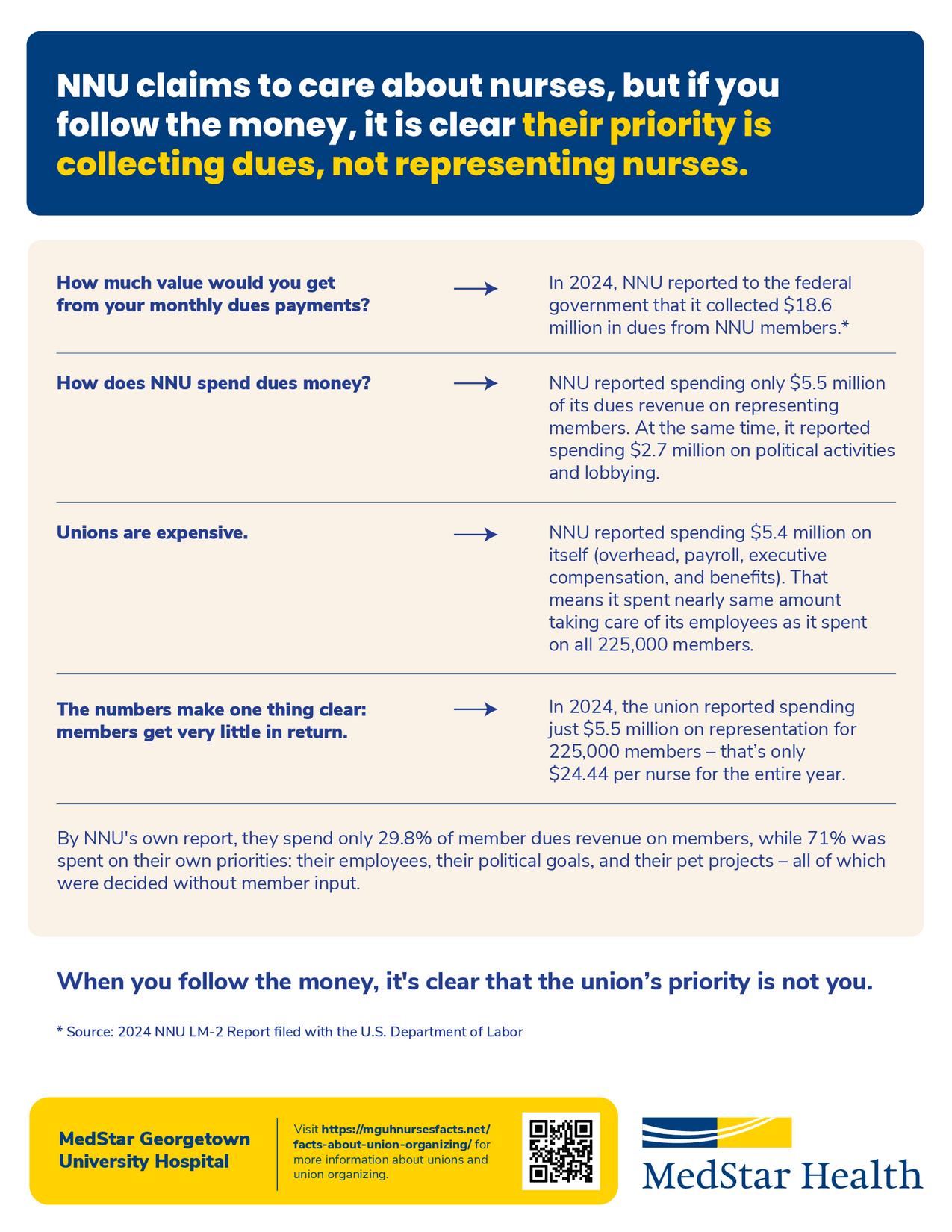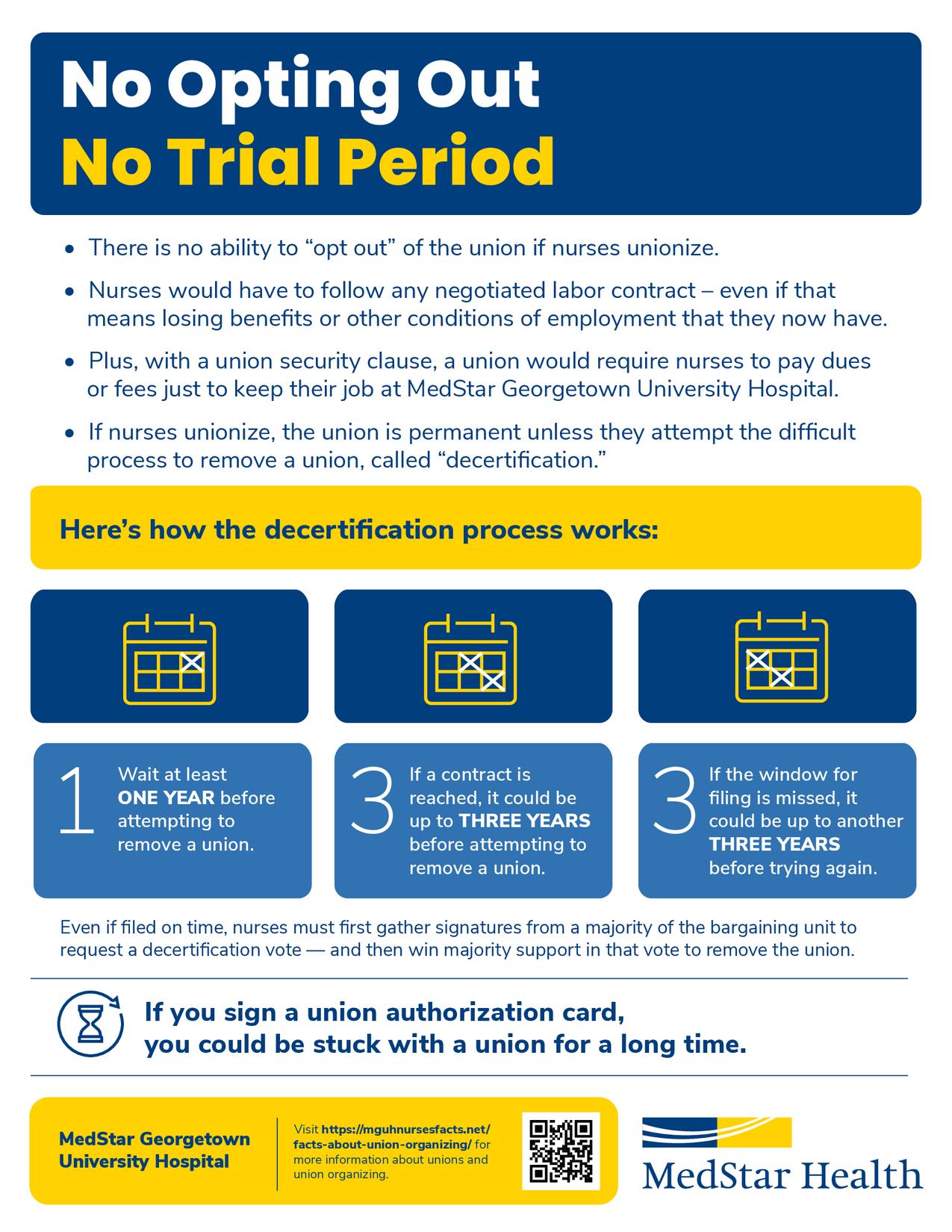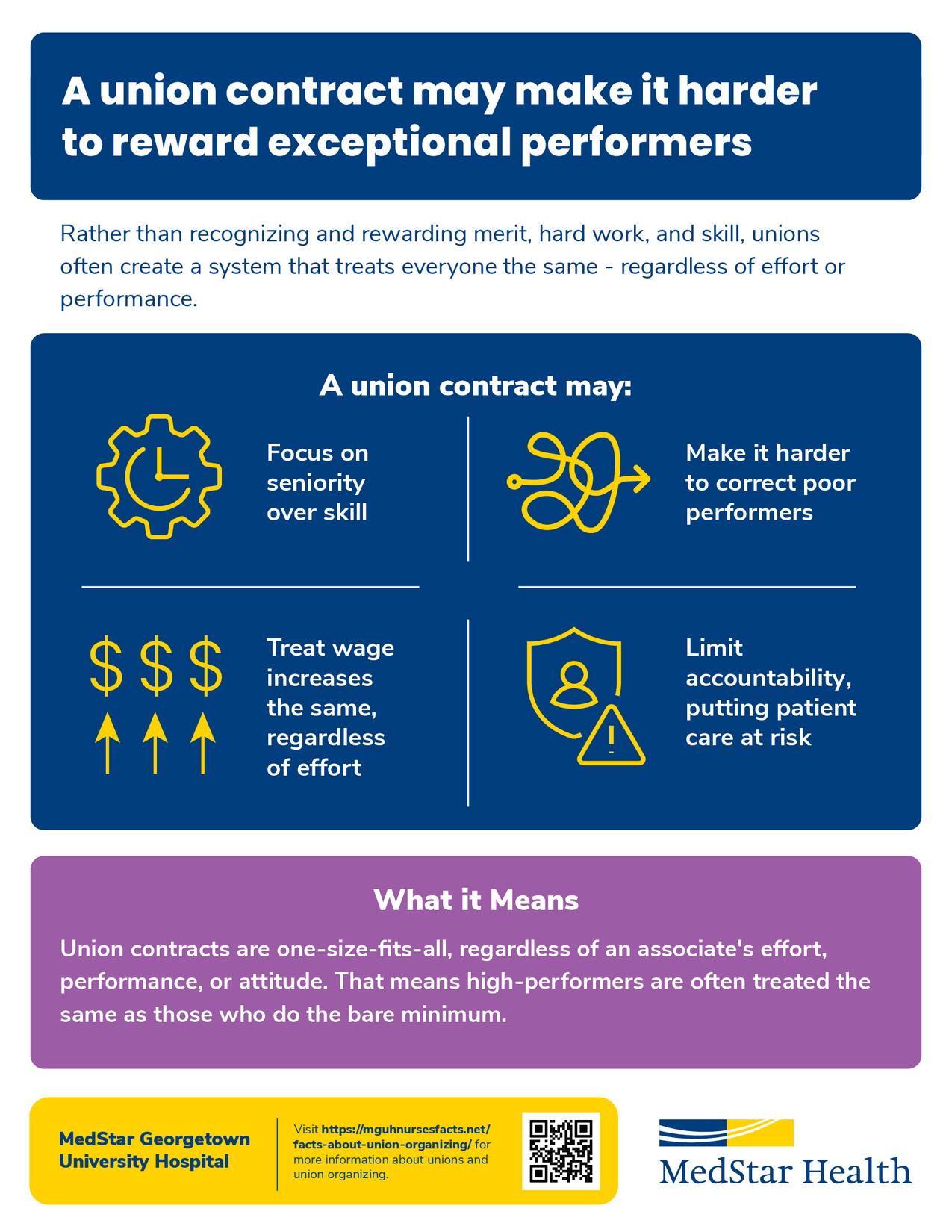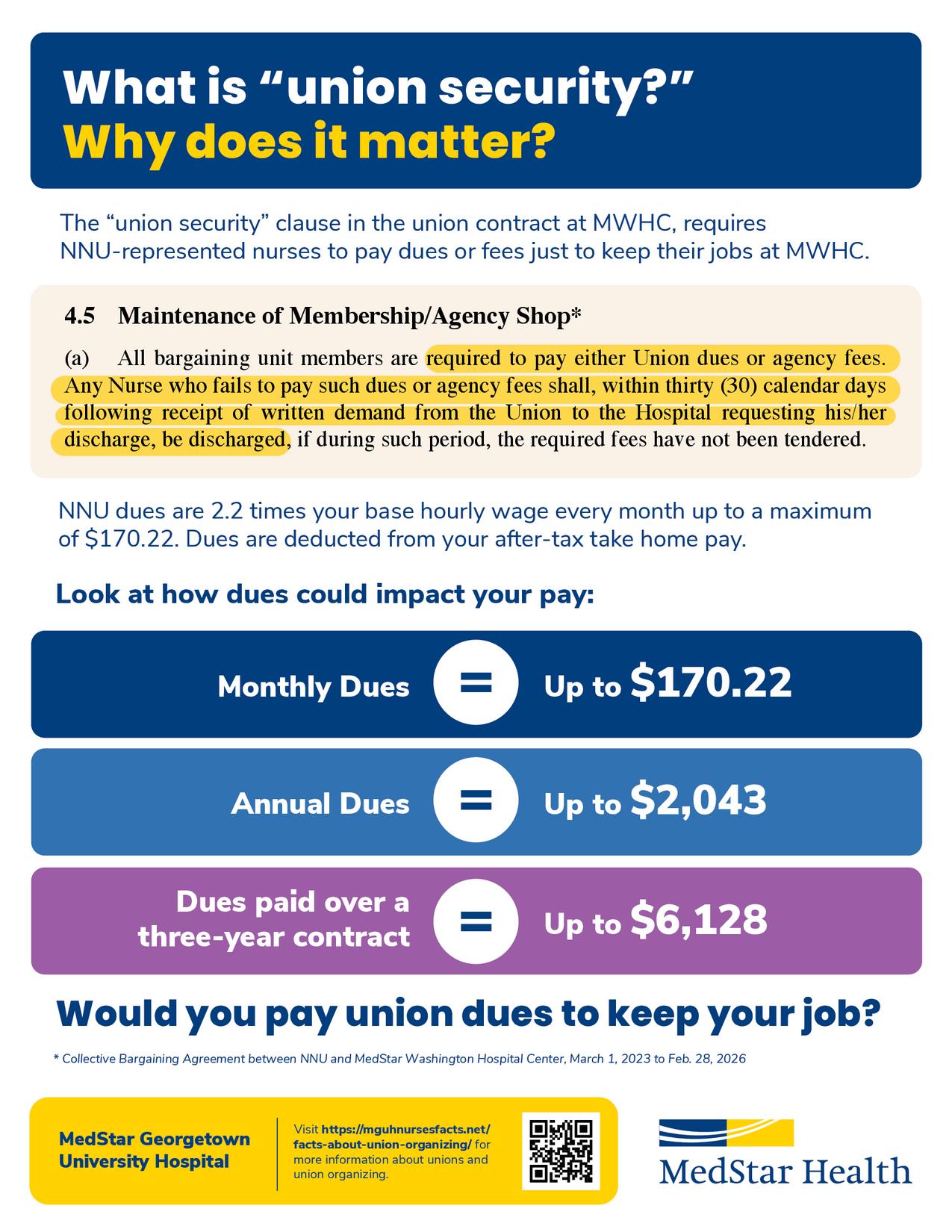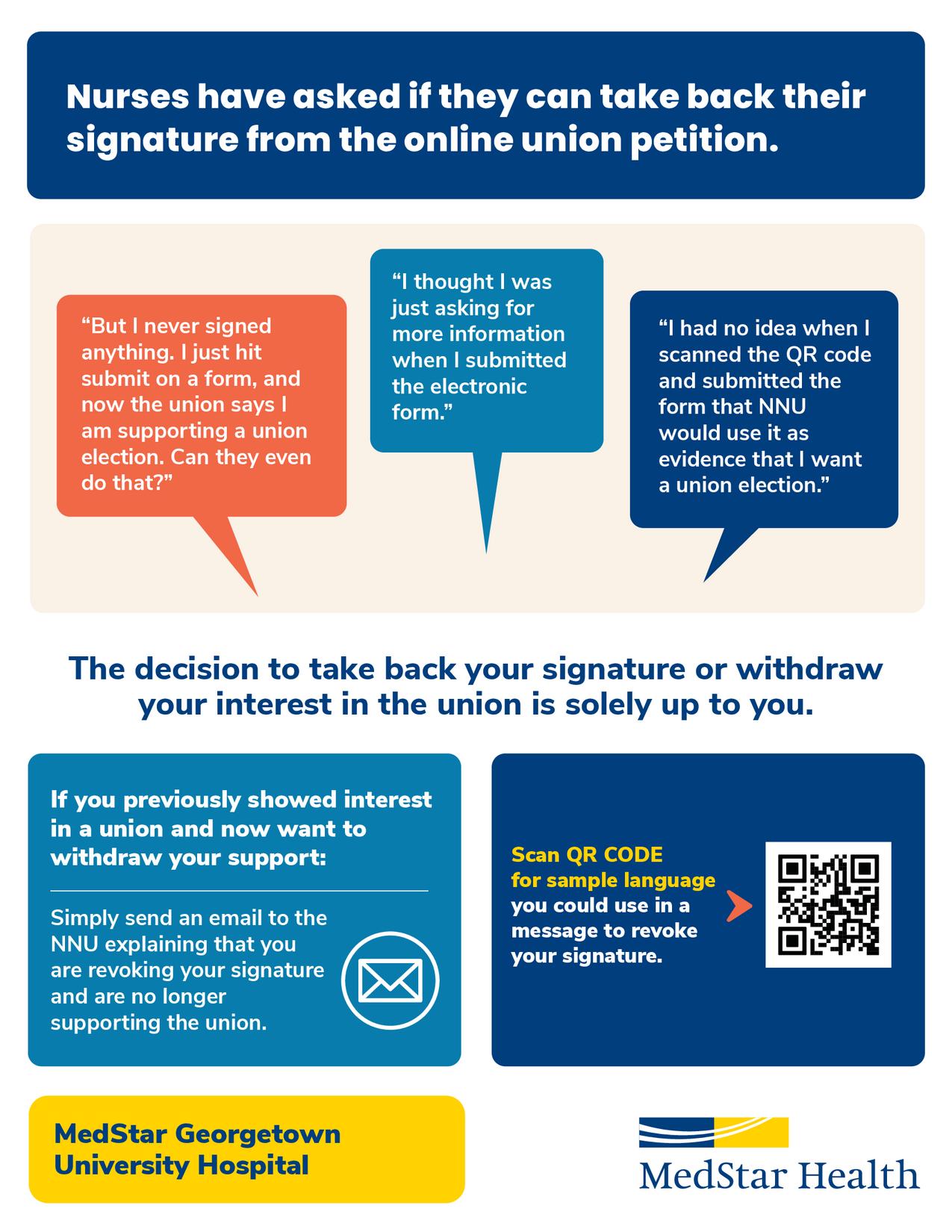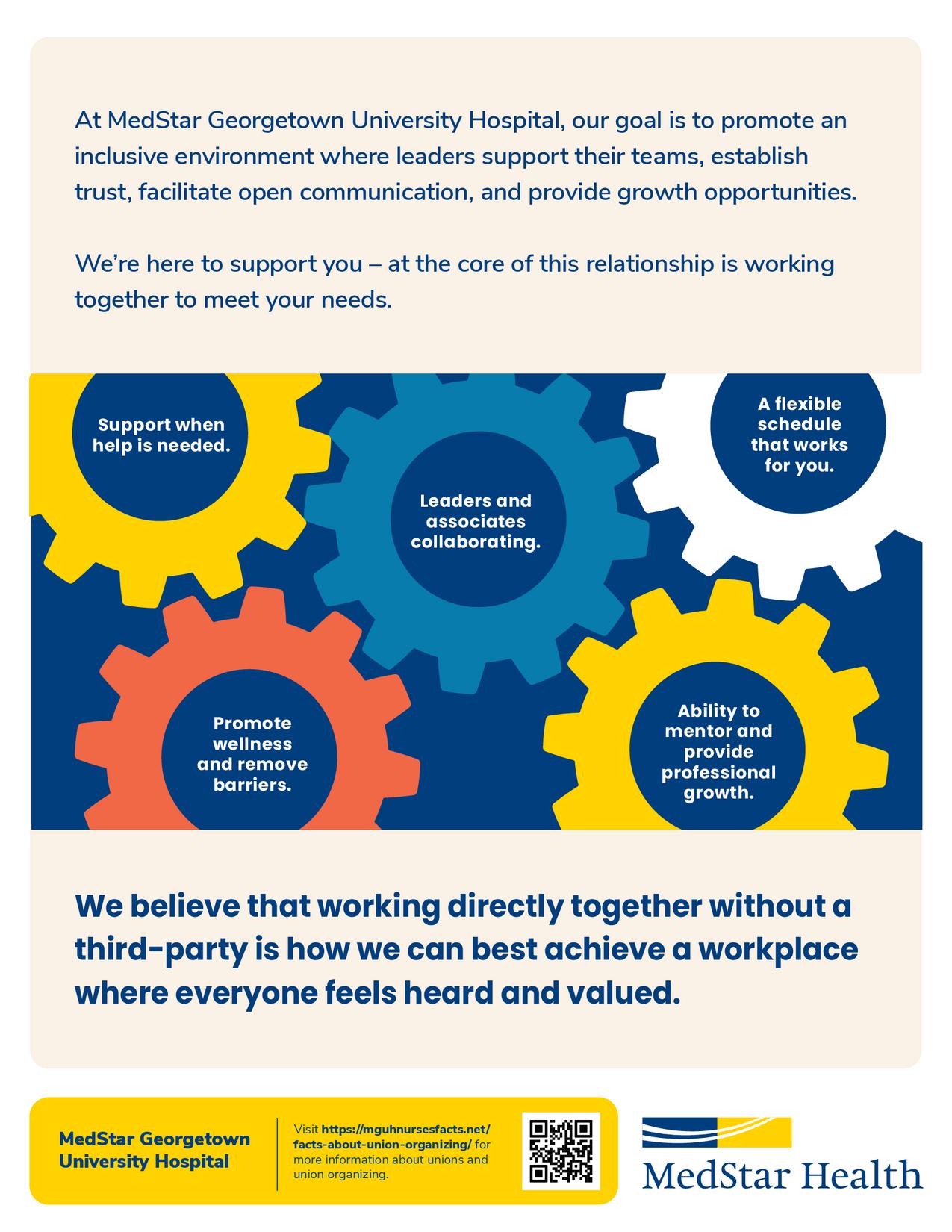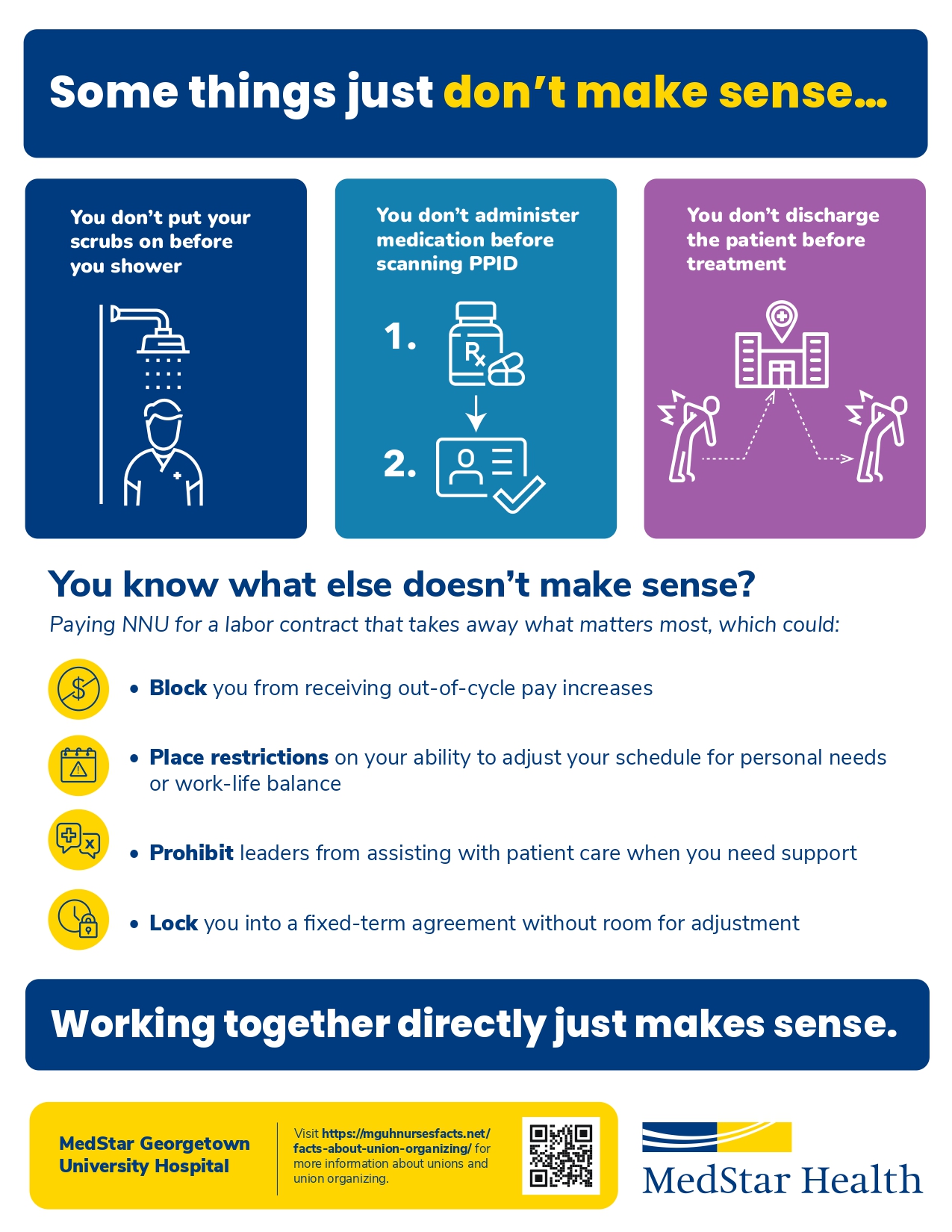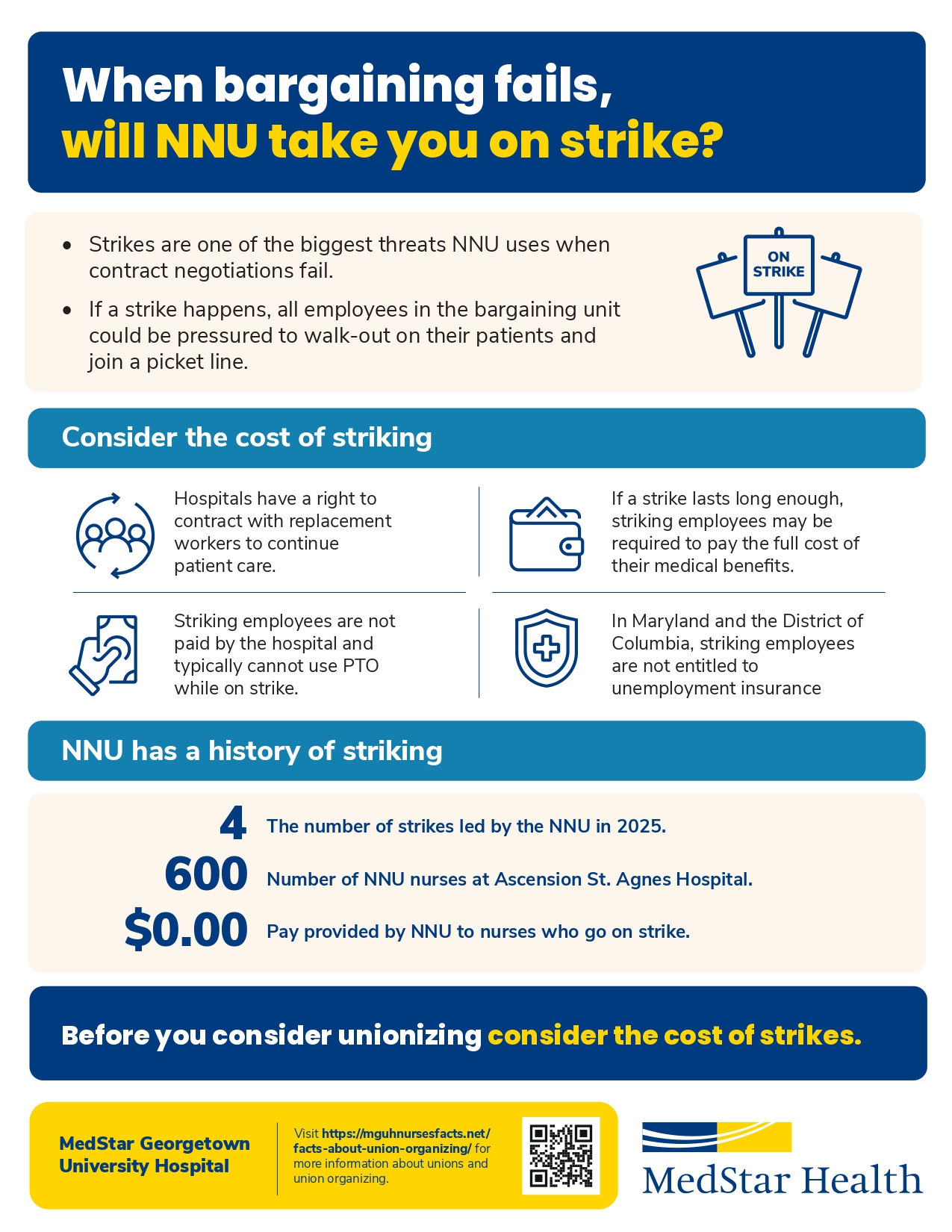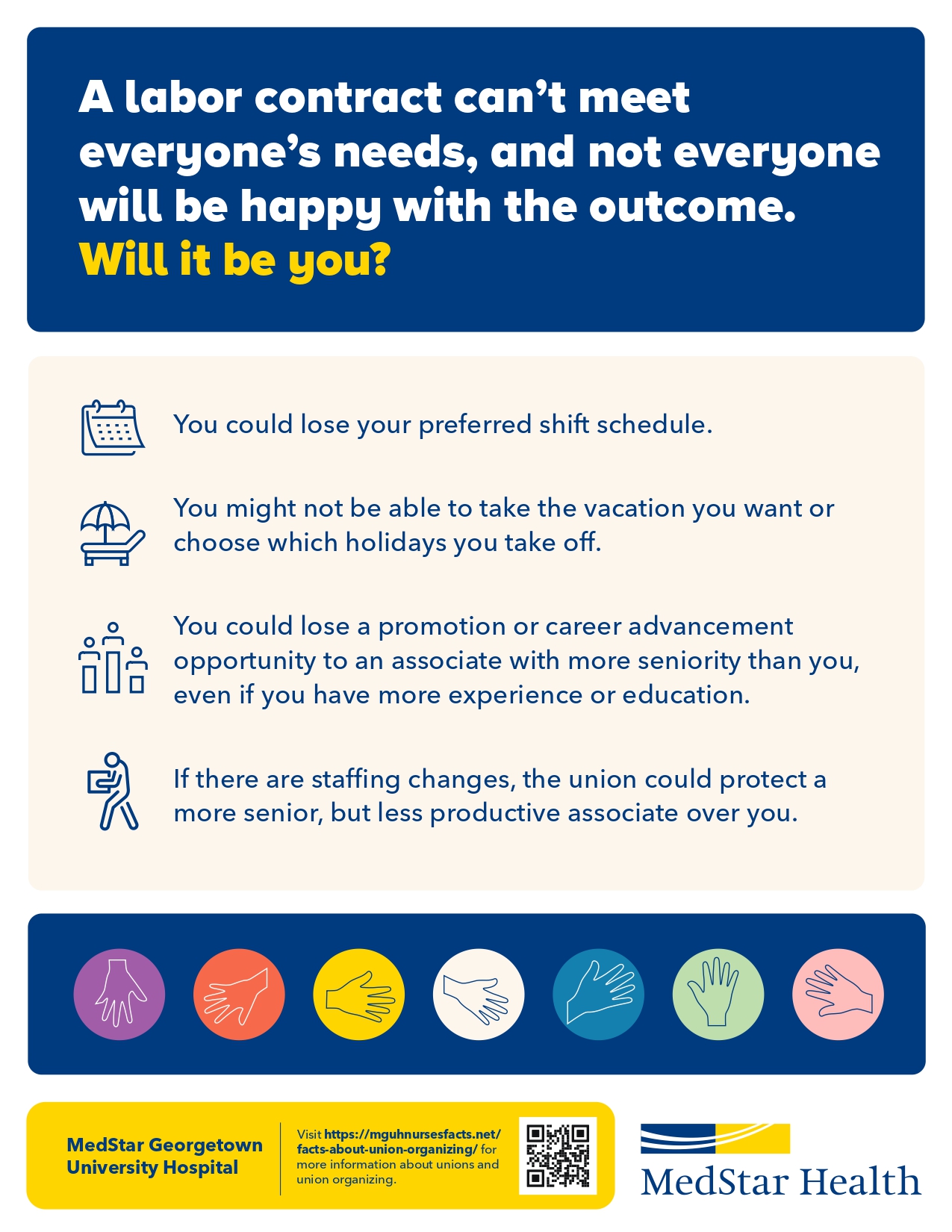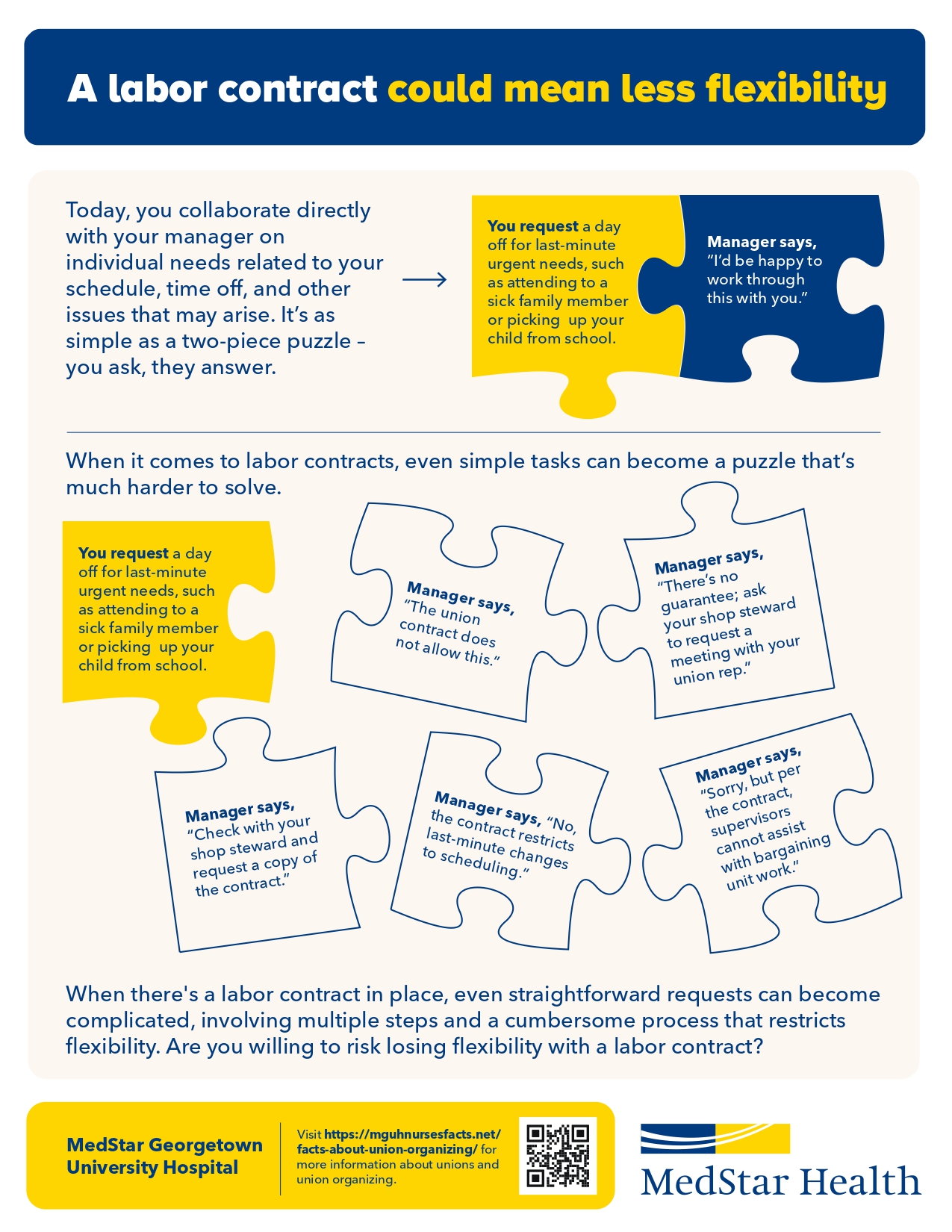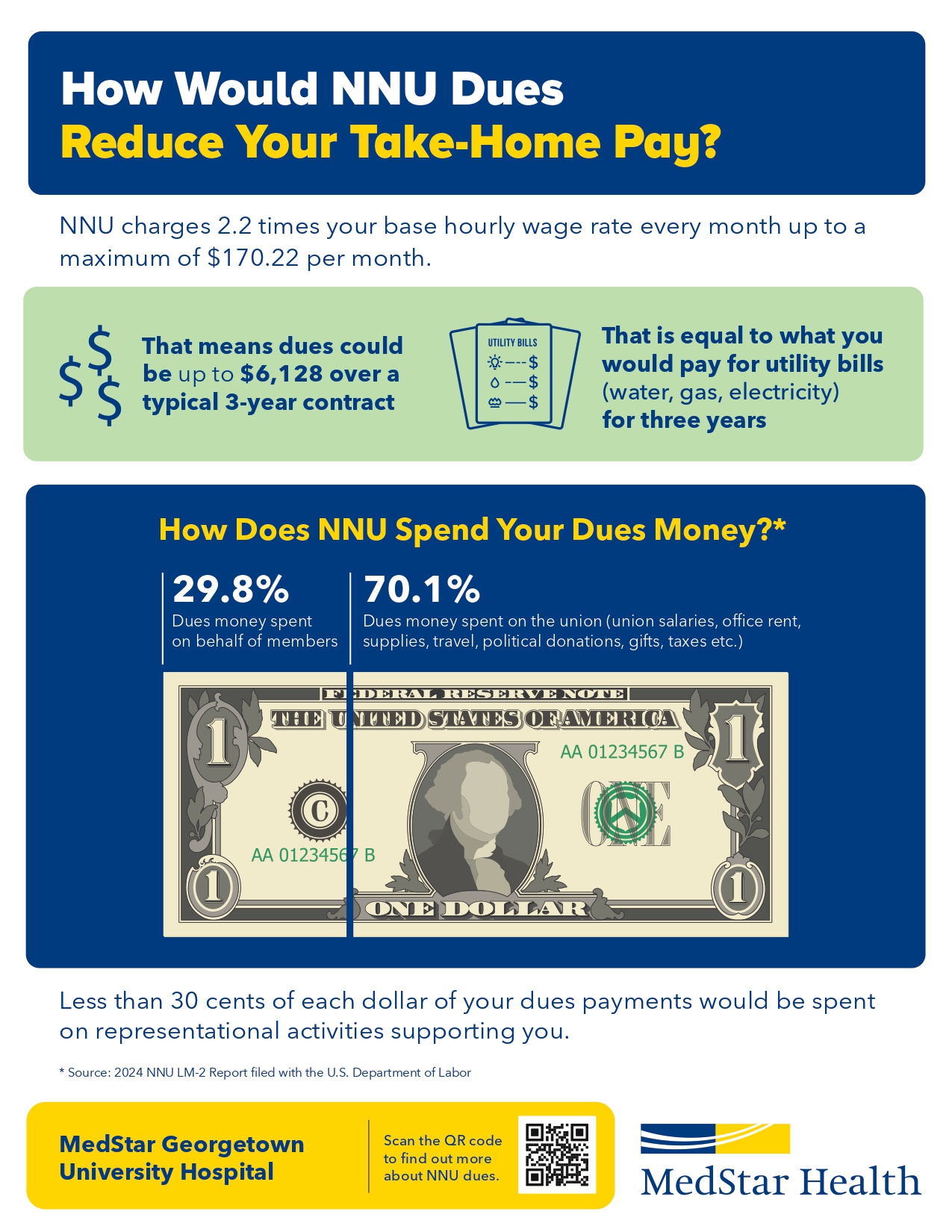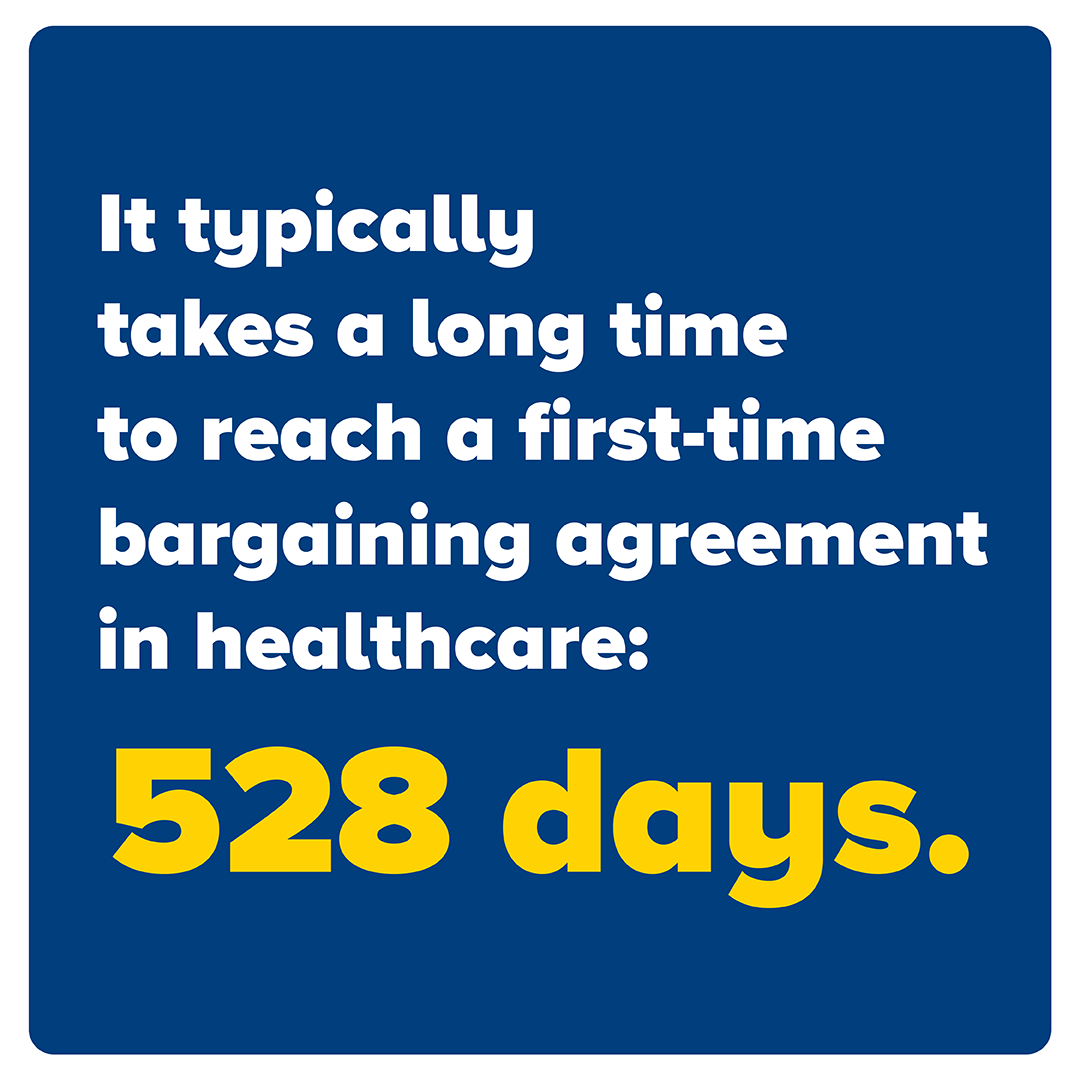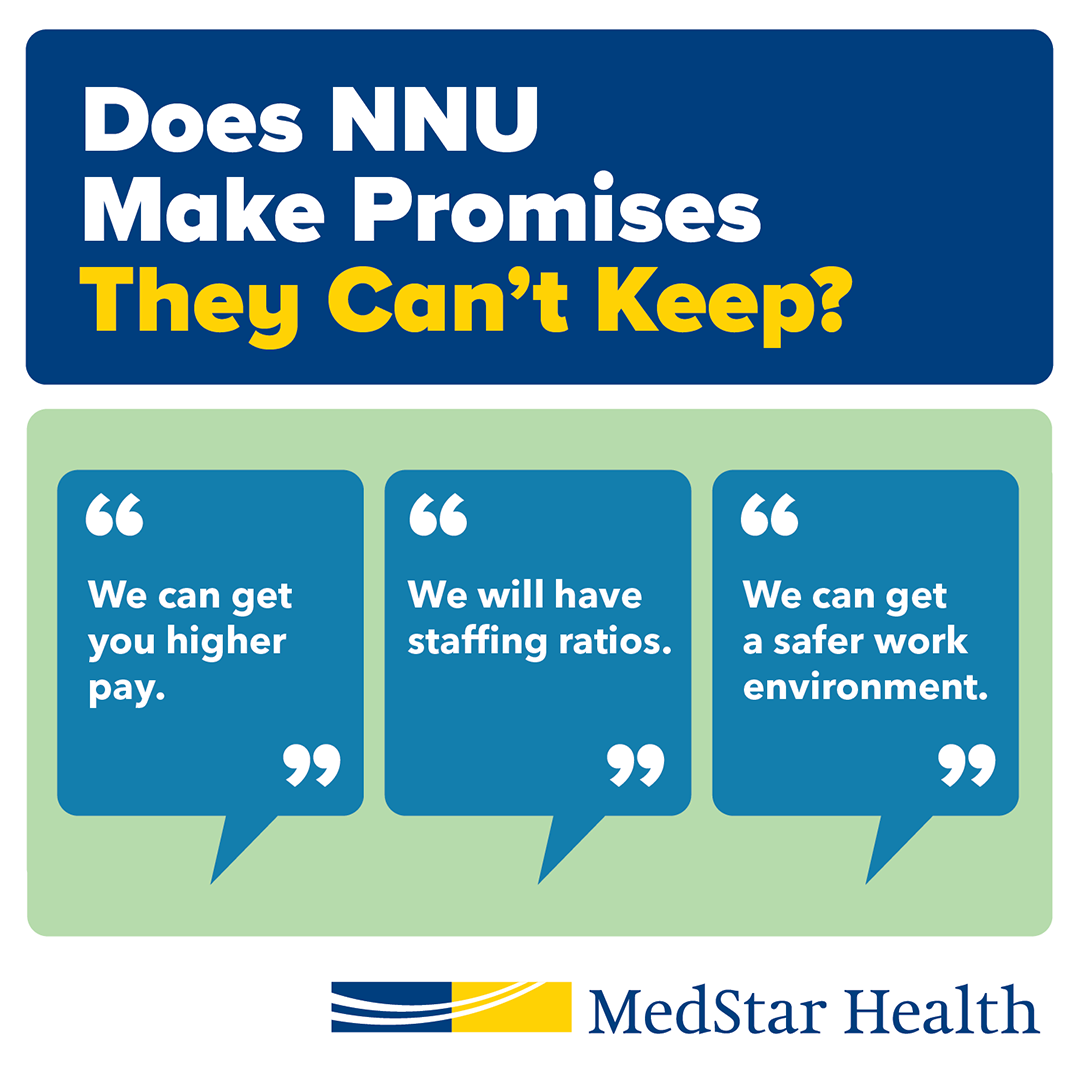Feeling Over It? You Are Not Alone.
We have heard from many nurses who say they are done with NNU’s ongoing organizing activity.
Done with divisive behavior.
Done with misleading claims.
Done with repeated, unwanted pressure on associates.
If this does not reflect what you want for your workplace, you have the power to make it stop.
If You Are Not Interested
- Say “no” to union organizers
- Do not sign an authorization card
- If you have already signed and feel misled or have changed your mind, you can ask for your card back
We will continue to foster a culture of mutual respect. We recognize that people may disagree, and we expect those conversations to remain professional and respectful. We will always stand up for individual rights, regardless of a person’s position on unions.
Is NNU Right for You?
NNU often makes promises it cannot guarantee.
Union promises may sound appealing, but what is the reality?
Just look at what is happening at hospitals in our area. NNU nurses at St. Agnes Hospital in Baltimore and George Washington University Hospital have seen little to no progress on union contract negotiations for more than two years. There have been no wage increases, no meaningful improvements to benefits, and continued uncertainty.
We are focused on working directly with you, supporting you, improving your work experience and the quality of care we provide to our patients.
Union Promises Are Not Guarantees
Unions often make big promises they cannot keep. Under federal law, unions may make statements that are misleading or false to gain support.
NNU has been contacting our associates and making commitments they simply cannot guarantee. In several cases, they are promising outcomes that can only be determined through collective bargaining, a process where nothing is automatic, and both sides must agree to any change in wages, benefits, or working conditions. These assurances may sound appealing, but they are not promises a union can deliver on its own, nor are they guaranteed to appear in a final contract.
Do not let the union mislead you into supporting it.
You work hard. You care for patients. You make sacrifices every day.
Before you’re asked to invest your money or your trust, you deserve to know whether the union you’re paying is actually delivering value or simply collecting dues.
3 Quick Things About Unionization
Who Speaks for You?
If you were unionized, you would give up the right to speak directly with your leader about work, pay, benefits, and other terms of employment.
Even if you have a good relationship with your leader, a third party can complicate the resolution of issues.
A union contract addresses the collective needs of the group, not individual concerns. This one-size-fits-all approach might restrict matters that are important or specific to you.
Nothing is Guaranteed
Union organizers and supporters say many things to gain your support, but the union is not legally obligated to fulfill any of the promises it makes.
Any changes to pay, benefits, or working conditions must be negotiated between the union and the employer.
While either side can propose changes, there’s no requirement for the other side to agree, and neither party can demand certain terms during collective bargaining.
Dues and Fees are Mandatory
If you were part of a union, you’d need to pay dues or fees to the union, which are often taken out of your paycheck after taxes.
And unions can raise these dues or fees at any time.
Just like the NNU contract at MedStar Washington Hospital Center, the union could force MedStar Health to terminate your employment if you refuse to pay the union when they come to collect part of your paycheck.
No Opting Out, No Trial Period
Unionization has long-term implications. Once a workplace is unionized, employees can’t simply opt out. Here’s what the union is not telling you:
- You must follow the negotiated contract, even if it means paying dues or losing certain benefits.
- Removing a union is a lengthy and difficult process.
- You must wait at least one year before trying to remove it.
- If a contract is in place, you may have to wait up to three years.
- Missing the filing window could mean another three-year wait.
Make sure you understand what you’re signing because once you do, it could be years before you can change it.
How Union Contracts Could Hurt Exceptional Performers
Union contracts are often promoted as fair and equitable. In reality, they can make it harder for leaders to recognize and reward exceptional performers. A one-size-fits-all contract means everyone is treated the same, whether you go above and beyond for your patients or do the bare minimum.
The problem is that union priorities don’t always align with the priorities of nurses, patients, or the hospital. For example:
- Seniority over skill: Advancement and scheduling decisions are often based on years worked, not expertise or performance.
- Protecting poor performers: The grievance and arbitration process makes it difficult to address performance issues that affect patient safety, teamwork, and morale.
- Uniform raises: Pay increases are determined by a union contract and are the same for everyone, regardless of individual effort or contribution, leaving exceptional performers undervalued.
- Accountability: Union contracts often limit accountability, which could put patient care at risk.
Rather than recognizing and rewarding merit, hard work, and skill, unions often create a system that treats everyone the same, regardless of effort or performance.
Required Dues Could Exceed $2,000 a Year – Exceeding $6,000 Over a Three-Year Contract
If you were unionized, nurses in the bargaining unit would be required to pay dues, often exceeding $2,000 per year. Over the life of a typical three-year contract, these dues can add up to over $6,000.
This is due to a provision known as a “union security” clause. This clause requires represented nurses to pay dues or fees to keep their jobs. It is non-negotiable and, if included in a contract, the union can require the employer to terminate anyone who does not pay union dues.
Ask yourself: Is it really worth paying NNU and giving up a portion of your paycheck to keep your job?
Your Signature for Authorization is Solely Up to You
Unions often mislead nurses to gain their support. Signing or not signing a card is a personal decision. Even if you signed a union card, you still have the right to withdraw it.
Remember, you’re not alone. Many nurses later realize that signing a card isn’t in their best interest.
The information below can be copied and pasted into an email to request the revocation of an authorization card.
To: clanham@nationalnursesunited.org
Mid-Atlantic Region / NNU
Silver Spring
8455 Colesville Rd, Suite 1100
Silver Spring, MD 20910
I am revoking my authorization for NNU to represent me for the purposes of collective bargaining. Please return my authorization card to the address below. Additionally, please remove my name from future NNU outreach efforts and do not sell, rent, or otherwise share my personal information with any other labor union or organization.
Your Name: [insert name]
Hospital Name: [insert hospital name]
Your Email or Phone Number: [insert contact information]
Working Directly Together
At MedStar Health, we value our relationships and want all our nurses to feel supported in their work experience.
Need coverage or a change to your schedule?
Together, we can flex to what works.
Looking for the next step in your career?
Together, we can look for growth opportunities.
Looking for a leader to lean on, or need extra support?
Together, we can tackle anything.
“Together” is kind of our thing.
Let’s continue to work together to make meaningful change.
What You Could Lose
A labor contract could change your working relationships and stop your leader from stepping in to help with responsibilities, even in dire situations.
Another potential downside is the inflexibility that labor contracts impose, which can hinder career advancement, block out-of-cycle pay increases, restrict scheduling, and compromise work-life balance.
For many nurses, paying for a contract that could take away things they enjoy about their job and restrict their growth, both financially and professionally, just doesn’t make sense.
The Cost of Strikes
NNU has a history of calling strikes. If a strike occurs, all associates in the bargaining unit might be pressured to leave their patients and join the picket line.
NNU typically does not provide strike pay for members who join a strike, even though striking nurses do not receive pay from their employer during strikes. In fact, NNU has called four strikes already this year, and it has paid its nurses a total of $0.
So, what is the cost of striking?
For the union:
For nurses:
Understanding Union Seniority
What does union seniority really mean?
The truth is that union contracts can’t meet everyone’s needs. Here’s how seniority tends to play out:
- Those who have been here longer often get the shifts they want, which can leave newer associates frustrated, constantly stuck with undesirable shifts.
- Seniority will likely determine who can take vacations or holidays at their preferred dates and times.
- Sometimes, the most senior associates are chosen for promotions, even when someone else has better qualifications or would be a better fit for the role.
- If there are staffing changes, the union typically prioritizes those with more seniority, even if they’re not performing as well as newer associates.
While union contracts claim to promote fairness, they often end up favoring those who have been in the organization the longest. We believe in recognizing the skills and contributions of everyone, not just their length of service. It’s about making sure we have the best people in the right roles to support our patients and their families.
Flexibility
Joining a union may reduce your scheduling flexibility. Currently, you can work directly with your manager to request time off and schedule changes. In a unionized environment, these decisions are subject to a collective bargaining agreement, which may complicate approvals and enforce stricter rules.
Your requests may require adherence to a contract or union approval, which could potentially cause delays and prioritize those with seniority or closer ties to the union. Additionally, communication with your manager may become more formal, which can limit your ability to address scheduling issues easily. This shift can create a more rigid work environment, making personal advocacy for promotions more challenging, as these matters will be handled collectively rather than individually.
So, what could a union contract restrict or control?
- Your ability to receive an additional pay increase between review cycles
- Your ability to advocate for yourself
- Your ability to leave work early to accommodate your child’s sports event or go to a concert
- Your ability to flex to another unit to work more hours and/or overtime
- A supervisor assisting with patient care when a unit is short-staffed, or when you need coverage
- Your ability to modify your shift start or end time to accommodate an urgent need for a personal matter
- Your ability to plan vacations or select holidays off
Union Dues
If National Nurses United (NNU) unionize nurse associates at MedStar Georgetown University Hospital you will be required to pay monthly dues to NNU. Dues are deducted from your after-tax take home pay.
Currently, NNU dues are 2.2 times your base hourly wage each month, up to a maximum of $170.22 per month.
For example, if you are a full-time RN and earn $40 per hour you would owe the union $88.00 per month or $1,056 per year. Over the course of a typical three-year union contract, you would pay nearly $3,200 in union dues.
For part-time/per diem RNs who are paid for 52 hours or fewer per month, dues are a minimum of $85.11 per month, which could add up to a minimum of $1,021 per year.
When your base hourly rate increases, so does the amount you would pay in union dues. And you could be forced to pay even more dues since NNU has the right to raise dues at any time.
Collective Bargaining: Status Quo
If a union election is held and a union is elected, it could take a year and a half or longer to negotiate a contract. While you wait for a contract, your employer is legally required to maintain status quo on wages, benefits, and other terms and conditions of employment. Changes cannot be made unless the union specifically agrees. Sometimes, a union will withhold agreement on employer proposals to secure an agreement on another issue that is important to the union.
In our region, nurses at two hospitals are experiencing this state of uncertainty firsthand. At Ascension Saint Agnes Hospital, nurses voted to unionize in November 2023, and as of May 2025 are still without a contract. Similarly, in Washington, D.C., nurses at George Washington University voted to unionize in July 2023, and as of today a contract has not been reached.
Promises ≠ Actions
NNU and other unions might make a lot of promises, and they might sound appealing. But nothing is guaranteed during collective bargaining. If the union wins an election, it wins the right to negotiate on your behalf, but our hospital isn’t under any obligation to agree to anything. The union’s promises aren’t automatically granted, and the union can’t require that certain things be negotiated, even if it says it can.
Before you give away control of your MedStar Georgetown University Hospital work experience to a union, consider this:
- A union cannot guarantee higher pay or better benefits.
- A union cannot require us to hire new nurses or direct how units are staffed.
- A union cannot change hospital policies or procedures.
You Have Rights
We respect our associates’ right to make free and informed decisions. Further, we support our associates’ legal right to choose for themselves whether or not to unionize.
- The right to refrain from any union activity.
- The right to engage in union activity and support the union.
- The right to campaign against the union.
We are aware that union organizers can be extremely persistent. We support Federal law that provides our associates with the following rights:
- YOU have the right to sign or not sign a union card, petition or online form.
- YOU have the right not to be bothered by union supporters while you are working or in patient care areas.
- YOU have the right to talk or not talk to a union representative if you are contacted at home.
- YOU have the right to tell union organizers you are not interested.
- YOU have the right to say “No.”
Our mission to provide extraordinary patient care is best accomplished when our associates’ voices are heard, when we work directly with one another, and when associates speak for themselves and our patients without intervention from outside organizations.
Myths vs. Facts
Myth: If we support a union, we might not get everything, but at least we’ll get something.”
Fact: Any changes would have to be negotiated between the union and MedStar Georgetown University Hospital. Collective bargaining is a give-and-take process, and while both sides can put forth its proposals, there are no guarantees. And no one knows what a final contract will look like—you could get more, but you could also end up with the same as what you have today, or even less.
Myth: With a union, we will decide what the policies and work rules are.”
Fact: The union would not have a say in MedStar Georgetown University Hospital’s policies and day-to-day operations. Those matters are typically part of management rights, along with hiring and firing decisions, discipline, staffing and resourcing, and enforcing all policies, procedures, and work rules.
Myth: A union will have the authority to select supervisors.”
Fact: MedStar Georgetown University Hospital would retain the authority to make management decisions, including who is selected to be a supervisor. Our expectation of all leaders is to exhibit fairness at all times. If you ever feel this is not the case, please reach out to Human Resources.

